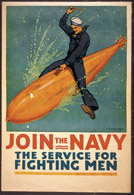Nautical terms that have crept into common parlance.
Scores of expressions come to us from naval operations. The word navy itself dates from the first half of the 14th century and is borrowed from the French navie, for “fleet.” Henry VIII created the first permanent battle fleet. A document from his reign stated: “The Navye.…hath ben…a greate defence and suertie [surety] to this Realme of Englande in tyme of Warre.”
Even earlier came the word admiral, derived from the Arabic amir, for commander. When the Moors conquered Spain and Sicily in the eighth century, amir became amir-al-bahr, “commander of the sea,” or in Spanish, almirante del mar. In 1297, England’s Edward I appointed William de Leybourne as admiral of the English seas in the Cinque Ports, responsible for fleets and other maritime matters. And in 1406 Henry IV created the office of the Lord Admiral, with an administrative role in naval affairs. Later “admiral” became the term for the most senior naval commander.
An important form of naval warfare was the blockade. This strategy dates from 1500 or earlier, but only became effective after 1700, when ships could cordon off the enemy for long periods. It became the critical offensive instrument of British sea power. During the War of 1812, British blockades of American harbors shut off trade and imposed great economic hardship on the United States. During the American Civil War the North used the strategy very effectively against the South. That war also gave rise to the term blockade running, for vessels entering or trying to enter a blockaded port. In civilian life, however, blockades are used in other ways, as by the police to cordon off streets for a parade.
During the late 19th and early 20th centuries, American and British gunboats patrolled the main rivers and harbors of China in order to ensure Western domination of the country. This tactic came to be called gunboat diplomacy. Gunboats, small armed craft manned by local seamen, had long been used to defend American harbors, and in the War of 1812 they defended New Orleans against the British until the arrival of Andrew Jackson. But linked with “diplomacy,” the term meant what William Safire defined as “the iron fist of threatened force inside the velvet glove of diplomatic relations.” Because it alluded to the Chinese experience of being influenced by force of arms rather than skilled negotiations, the term is generally used in a negative way, to criticize an undesirable policy.
A raylike fish that delivers a numbing electrical charge is called a torpedo (from the Latin torpere, to be stiff or numb). In late 18th-century America the name was given to a percussion shell, and by the time of the War of 1812, to a mine or attachment device used to blow up ships. The self-propelled torpedo first appeared in 1869 and by World War I had become what most people now call a torpedo. The term is also used to mean figuratively destroying or blowing up a plan. “Congress torpedoed the idea of another bailout.”
Sailing ships gave us many other terms. One such expression is in the doldrums, derived from an Old English word meaning dull or stupid. By the early 19th century the term applied to a ship that was becalmed and could make little or no headway. It often referred to a belt of calm lying close to the equator. At about the same time the expression was used for a person who was bored or depressed or otherwise stagnant; it also could be applied to an organization that was making no progress, as in “It was near the Christmas break and Congress seemed to be in the doldrums.”
Another expression is a clean bill of health, indicating someone or something is in good shape. The term comes from the certificate once issued by a port authority to confirm that none of a ship’s crew had a contagious disease and that no contagion existed in the ship’s port of departure. If infectious disease was present, the ship was issued a “foul” bill of health. Today the term can be used for individuals (“The doctor gave John a clean bill of health”) and for organizations (“The company received a clean bill of health concerning its finances”).
Christine Ammer has written dozens of word books, including Facts on File Dictionary of Clichés, 3rd ed. (November 2011).






